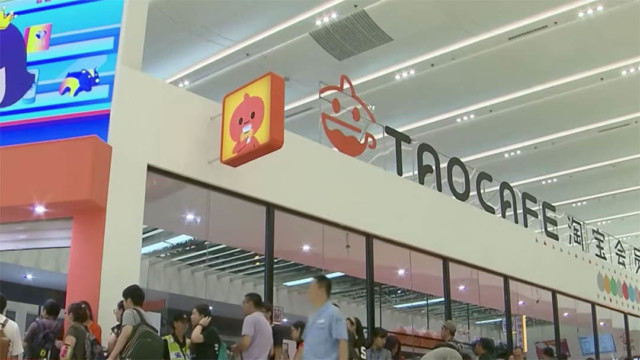E-commerce giant Amazon is developing a store that has no employees–when shoppers walk in, they scan a QR code on their phone. Then, they’re tracked as the pull items from store shelves. When they have everything they want, they walk out– and are automatically charged– no checkout line required.
The store is located in the U.S. city of Seattle. Right now, only Amazon employees can go in. On the other side of the world, Chinese e-commerce giant Alibaba has just opened its first unmanned store.
CGTN’s Elaine Reyes reports.
Alibaba’s new store, “Tao Caf?” is now open in the eastern Chinese city of Hangzhou. Customers scan a QR code from their phones when they walk out.
When they leave, facial recognition technology identifies the customer and their accounts are automatically charged. Alibaba’s CEO says this concept will grow.
“We are not going to design a store that everyone is already familiar with,” said Alibaba CEO Zhang Yong. “In the same way, we are not going to make a cafe that you all are already familiar with. The truth is, that cafes need to be redefined. Supermarkets need to be redefined. In the same way, all circumstances where retail takes place, say, shopping malls, department stores, general stores, shopping centers, convenience shops, all these business models can be redefined in today’s technology,” Yong said.
The store is part of a new “artificial intelligence town” in Hangzhou. There are more than 100 projects in development here showcasing some of China’s latest ideas. It’s an incubator for ideas, putting them into action.
“I think this place has a very dense innovative atmosphere, an ample imaginary space and active private capital,” Hao Aimin, Alibaba’s Deputy Director for VR Technology and Systems. “We are capable of gathering talents and incubating enterprises here.”
China has hosted a number of conferences this month on artificial intelligence, or A-I. In Tianjin, people from 17 countries attended the inaugural World Intelligence Congress.
In Shenzhen, voice assistant technology was a highlight at the Global Artificial Intelligence and Robot Summit. Attendees say the technology – like Siri – is virtually everywhere now. But, they say it’s still quite limited- and can only answer simple questions like “what’s the weather in Shenzhen today?”
“You ask for weather, you ask for Shenzhen and you ask for today, and then using these three key words, it does a search,” said Zhang Hongjiang, a partner in Source Code Capital. “What it returns to you is today’s weather forecast. That’s completely different from understanding, you know.”
Chinese Premier Li Keqiang says artificial intelligence is important for the country’s plan to boost development through innovation. China’s Ministry of Science and Technology is playing a leading role. It’s working on a national plan to develop the next generation of artificial intelligence.
“The new generation of artificial intelligence technology is rapidly penetrating into all walks of society and transforming every part of the economy such as production, distribution, exchange and consumption,” said Wan Gang, China’s Minister of Science and Technology. “It is creating a transition to the new types of economy, industries and business modes, to speed up the change from a digital and internet-based social and economic development model to a smarter one.”
Scott Schrober on the very real presence of artificial intelligence in China
CGTN’s Elaine Reyes spoke with Scott Schrober, President and CEO of Berkeley Vari-tronics Systems, about the development of artificial intelligence in China.
 CGTN America
CGTN America

